Rectal cancer: symptoms, diagnosis, and treatment options
Rectal cancer is a form of cancer that begins in the rectum, the final several inches of the large intestine. It often develops slowly from polyps and can cause symptoms such as changes in bowel habits, bleeding, unexplained weight loss, and fatigue. Early detection improves treatment choices and outcomes, so understanding risk factors, screening, and common signs is important for people and health professionals alike.

This article is for informational purposes only and should not be considered medical advice. Please consult a qualified healthcare professional for personalized guidance and treatment.
How does rectal cancer relate to the colon?
The rectum is the last segment of the colon and shares many cellular and clinical features with colon cancer, but rectal cancer can behave differently and may require distinct treatment approaches. Tumors in the rectum can affect bowel control, cause localized pain, or obstruct stool passage earlier than some colon cancers. Because of the rectum’s proximity to pelvic structures, treatment planning often involves a multidisciplinary team that considers surgery, radiation, and chemotherapy based on tumor location and stage.
What symptoms include weight loss and fatigue?
Unexplained weight loss and fatigue can be symptoms of rectal cancer, especially as disease progresses and the body’s nutritional status is affected. Weight loss may result from decreased appetite, changes in digestion, or metabolic effects of cancer. Fatigue can arise from anemia due to chronic bleeding, from the cancer itself, or from the emotional and physical strain of symptoms. While these signs are non-specific and can occur with many conditions, their presence together with bowel changes warrants medical evaluation.
How is rectal cancer diagnosed?
Diagnosis typically begins with a clinical assessment of symptoms and a physical exam, including a digital rectal exam. Colonoscopy is the key diagnostic test, allowing direct visualization and biopsy of suspicious areas. Imaging tests such as pelvic MRI, CT scans, or endorectal ultrasound help determine tumor size and whether nearby lymph nodes or organs are involved. Blood tests may include complete blood count to check for anemia and tests for tumor markers in selected cases. Staging combines these findings to guide treatment planning.
What treatment options exist for rectal cancer?
Treatment depends on tumor stage, location within the rectum, and the patient’s overall health. Early-stage tumors may be treated with surgical removal alone, sometimes with minimally invasive techniques. More advanced rectal cancer often requires a combination of surgery, radiation therapy, and systemic chemotherapy to reduce local recurrence and address potential spread. For tumors close to the anal sphincter, specialized surgical approaches aim to preserve continence when possible. Palliative treatments are available to relieve symptoms and maintain quality of life if cure is not achievable.
Living after treatment and local services
Follow-up after rectal cancer treatment includes regular physical exams, colonoscopic surveillance, and periodic imaging to detect recurrence. Rehabilitation services, dietary counseling, and pelvic floor therapy can help manage long-term changes such as bowel dysfunction, sexual or urinary side effects, and nutritional needs. Many patients benefit from local services — including oncology nursing, support groups, and survivorship clinics — to coordinate care in your area. Discussing a survivorship plan with your care team helps clarify monitoring schedules and available supportive resources.
Conclusion
Rectal cancer is a type of cancer linked to changes in the colon and requires timely evaluation when signs such as altered bowel habits, bleeding, unexplained weight loss, or persistent fatigue are present. Diagnosis relies on colonoscopy and imaging, and treatment often combines surgery, radiation, and chemotherapy tailored to tumor stage and patient factors. Long-term follow-up and access to local services support recovery and quality of life. Because each case is different, individualized assessment and coordinated care remain central to effective management.






